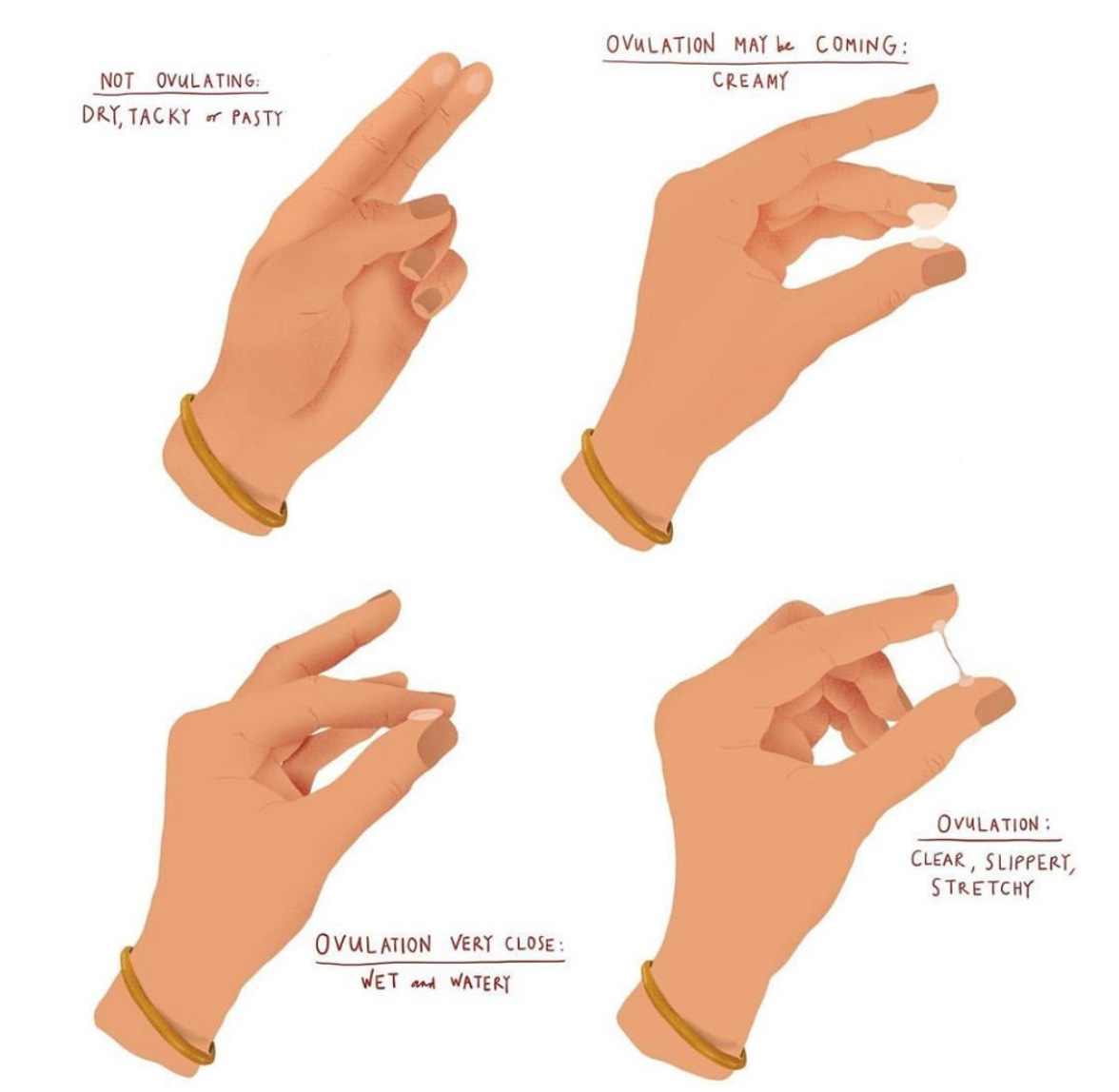What Ovulation Can Tell You That Your Period Can’t
28 Days of Decoding Your Body: The Hormone Balance Challenge 🕯️🍵🕊️ Day 18-19
When people talk about hormone healthy, it’s typically about:
period timing, flow, frequency e tc.
PMS
energy
cortisol
so so rarely, do people talk about ovulation unless you’re trying to get pregnant - or trying not to
when in reality: ovulation is actually the star of the show, arguably more important than your period
when we don’t ovulate, we are met with:
fertility challenges (okay, yes, self explanatory)
low progesterone (which means worsened acne and anxiety)
potential estrogen dominance and all those fun symptoms
irregular or long or missing periods
See, your period is largely dictated by when and if you ovulate.
And at its core, it’s a marker of how safe, nourished, and regulated your body feels. It’s your internal green light that says, hey, I’m well enough to create - life, yes, but also energy, clarity, stability.
And the days around ovulation? That’s when many of us feel most alive, more social, confident, clear-headed.
So today is a lil love letter to that often-overlooked window
So here’s what we’re diving into today:
What is ovulation?
Why would I not be ovulating?
How to tell if I’m ovulating
Why do I feel bloated/breakout during ovulation? and what to do
Today’s Hormone Balance Action Steps:
💪🏼 Action Step:
Have a citrus fruit daily (bonus ovulation recipe below)
✍🏼 Reflection: A lil spicy journal prompt to tap into our libido
What is Ovulation?
Ovulation is a single moment in time
It’s when one mature, chosen egg bursts out of the ovary and begins its journey through the fallopian tube, waiting to see if it’ll be fertilized.
If it is → congrats, pregnancy!
If it’s not → the body signals the brain to drop hormone levels and cue your period
Now, here’s the key: while the egg only lives for about 24 hours after ovulation, sperm can survive inside the female reproductive tract for up to 5 days. That gives us a 6-day fertile window
the five days leading up to ovulation and the day of ovulation itself = when we can get pregnant
Let me say this clearly: you can only get pregnant if and when you ovulate.
This isn’t a conspiracy theory (despite what some trolls in my Instagram comments seem to think). It’s basic biology.
Sperm + egg = baby.
No egg? No pregnancy.
This is why ovulation defines the “fertile window.”
Now while ovulation typically happens around the midpoint of your cycle, it can occur earlier or later - especially if your cycles are irregular or affected by stress, illness, or travel.
So when people say, “You can get pregnant at any time,” what they really mean is: if you’re not tracking ovulation, you might not know when that fertile window is.
And because ovulation’s main purpose is pregnancy, we also get these little superpowers around ovulation. Most women will feel…
High libido (duh, body wants you to have sex right now cause you’re primed for baby making)
Lots of confidence (duh, cause body wants you to shoot your shot)
Clear skin (duh, body wants you feeling yourself and attracting an attractive partner)
Tons of energy + drive (duh, body wants you to run not walk towards your partner with that high libido)
Lower appetite (duh, body is like forget food, we gotta keep our eye on the prize)
As such, ovulation is a MAJOR player in our cycle - and when it’s missing….that’s a big problem. That tells us something is inherently off
What Blocks Ovulation?
Ovulation is a sign that the body feels nourished, safe, and in rhythm. But when that safety signal is disrupted, the body may delay or skip ovulation altogether. Here are 5 common reasons ovulation gets blocked:
PCOS (Polycystic Ovary Syndrome)
One of the most common reasons for irregular or absent ovulation. In PCOS, elevated levels of LH (luteinizing hormone) and androgens like testosterone can interfere with the delicate hormone surge required for ovulation. The ovaries may begin to mature follicles but never release the egg.Undereating and/or Overexercising
The body views significant energy deficits as a threat. Whether from not eating enough, skipping meals, or training intensely without proper fueling, this physical stress can suppress the hypothalamic signals that kick off ovulation. Think of it this way: if the body is just trying to survive, it’s not going to prioritize reproduction.Chronic Stress
Emotional, mental, or physiological stress triggers the HPA axis (hypothalamus-pituitary-adrenal), increasing cortisol and signaling to the brain that it’s not a good time to conceive. Chronically elevated stress hormones can delay or completely shut down ovulation—even if you’re eating enough and exercising moderately.Disruption to Your Internal Clock (Travel, Shift Work)
Crossing time zones, staying up all night, or working overnight shifts can throw off circadian rhythm, which plays a big role in hormone regulation. Since hormones like LH and FSH follow a circadian rhythm, disrupting your internal clock can throw off ovulation timing or delay it altogether.Illness or Recent Vaccination
Acute illness or immune activation (like from a vaccine) places a short-term burden on the body. In response, your system may delay ovulation until the perceived stressor has passed. You might notice a delayed period, longer cycle, or no ovulation that cycle…and then a return to normal in subsequent months.
How To Tell If I’m Ovulating
Whether you’re trying to conceive, avoid pregnancy, or just understand your hormones, knowing if (and when) you ovulate is key.
Here’s how to tell if it’s happening (pick 2 to track)
1. Cervical Mucus Changes
Around ovulation, your cervical mucus becomes more slippery, stretchy, and clear -often compared to raw egg whites. This fertile-quality mucus helps sperm survive and swim more easily. If you notice this change mid-cycle, it’s a strong sign your body is preparing to ovulate.
📝 Tip: Check your cervical mucus each day before or after using the bathroom. You’re most fertile when it’s wet, stretchy, and abundant. It’ll often be slippery before
2. Shift in Basal Body Temperature (BBT)
After ovulation, progesterone causes a small but noticeable increase in body temperature - usually about 0.5–1°F. By tracking your temperature each morning before getting out of bed, you can confirm ovulation after it happens.
📝 Tip: Use a basal body thermometer (or something like Oura ring) and track daily for at least 2–3 months to find your personal pattern.
3. Ovulation Predictor
These at-home urine tests detect the LH surge that happens 24–36 hours before ovulation. A positive OPK means ovulation is likely coming soon, but it doesn’t guarantee the egg is actually released.
📝 Tip: Start testing a few days before your expected ovulation, especially if your cycles vary.
4. Cervical Position
Your cervix moves throughout your cycle. As ovulation approaches, it becomes higher, softer, and more open to allow sperm through. After ovulation, it lowers and becomes firmer and closed again.
📝 Tip: With clean hands, you could check at the same time each day. It may take a few cycles to notice the difference, but it's a powerful internal sign of fertility.
+ you may notice sensory changes like increased libido, mid-cycle cramping (called mittelschmerz), or confidence.
Putting It All Together:
The most reliable way to confirm ovulation is a combination of signs. Cervical mucus and predictor kits tell you it’s coming, and BBT confirms it happened. Tracking these patterns over time gives you insight into whether ovulation is regular—and how your body is responding to stress, nutrition, and lifestyle.
Wait, Why Do I Feel Crappy During Ovulation?
okay so yes, ovulation is often painted as the “feel-good” time of the cycle, but for some, it’s anything but. If you notice bloating, pain, breakouts, or irritability around mid-cycle, you’re not imagining it. Here's what could be going on:
If you have bloating + fluid retention
Around ovulation, estrogen levels peak, which can lead to water retention and digestive shifts. + you do have a lil more inflammation since something just burst out of an ovary…so this *may* be normal (depending on severity). If you're histamine-sensitive, rising estrogen can also trigger histamine release, which further contributes to bloating and inflammation.
🔎 Estrogen increases the expression of histamine receptors and decreases DAO (the enzyme that breaks down histamine), which can amplify histamine-related symptoms like bloating, headaches, or itchy skin.
If you have pelvic pain around ovulation
This isn’t just the mild twang that is more normal around ovulation, but rather deeper, true pain that can last a few hours to days. If this happens, you will want to talk to your doctor about a deeper workup (as this can be a sign of endometriosis).
🔎 If you have endometriosis, you may be more sensitive to this process. Inflammation around the ovaries or in the pelvic cavity can amplify the pain response and make ovulation feel downright miserable.
If you have acne breakouts during this time
Estrogen peaks just before ovulation and testosterone also gets a small boost to support libido and energy. For people with androgen sensitivity (or already elevated testosterone/DHEA), this can lead to a surge in oil production, clogged pores, and mid-cycle breakouts. For people with histamine sensitivities this can also be a big driver of mid cycle acne.
🔎 This is common in PCOS, or in anyone with blood sugar imbalances, poor detox, or histamine sensitivities.
If you have anxiety mid cycle
While estrogen is often mood-boosting, too much estrogen can feel like overstimulation and can also lead to an increase in histamines which can cause anxiety.
So, What’s the Root Cause of Feeling Bleh Around Ovulation?
PCOS or high androgens
Histamine intolerance (exacerbated by high estrogen)
Underlying inflammation, especially in endometriosis
Liver or gut sluggishness, which impairs hormone clearance
Put It Into Practice
Have a serving of citrus fruit x day
Citrus fruit - think: lemon, tangerines, oranges, strawberries, kiwi - are so rich in vitamin C which can help with egg quality, ovulation, progesterone production, and even support inflammation/pain.
So we recommend 1 serving of citrus or high quality vitamin C rich fruits early dang day. This can be as simple as including a piece of fruit with breakfast, as a snack later in the day, or if you’re struggling with sleep/digestion, go for kiwi before bed.
Looking for more? Try our ovulation smoothie that helps bring in both your seed boost and the bit of citrus.
ORANGE CREAMSICLE SMOOTHIE 🍊🍦
1 orange, peeled and segmented (remove seeds)
½ frozen banana
Keep reading with a 7-day free trial
Subscribe to Roots to Leaves to keep reading this post and get 7 days of free access to the full post archives.







